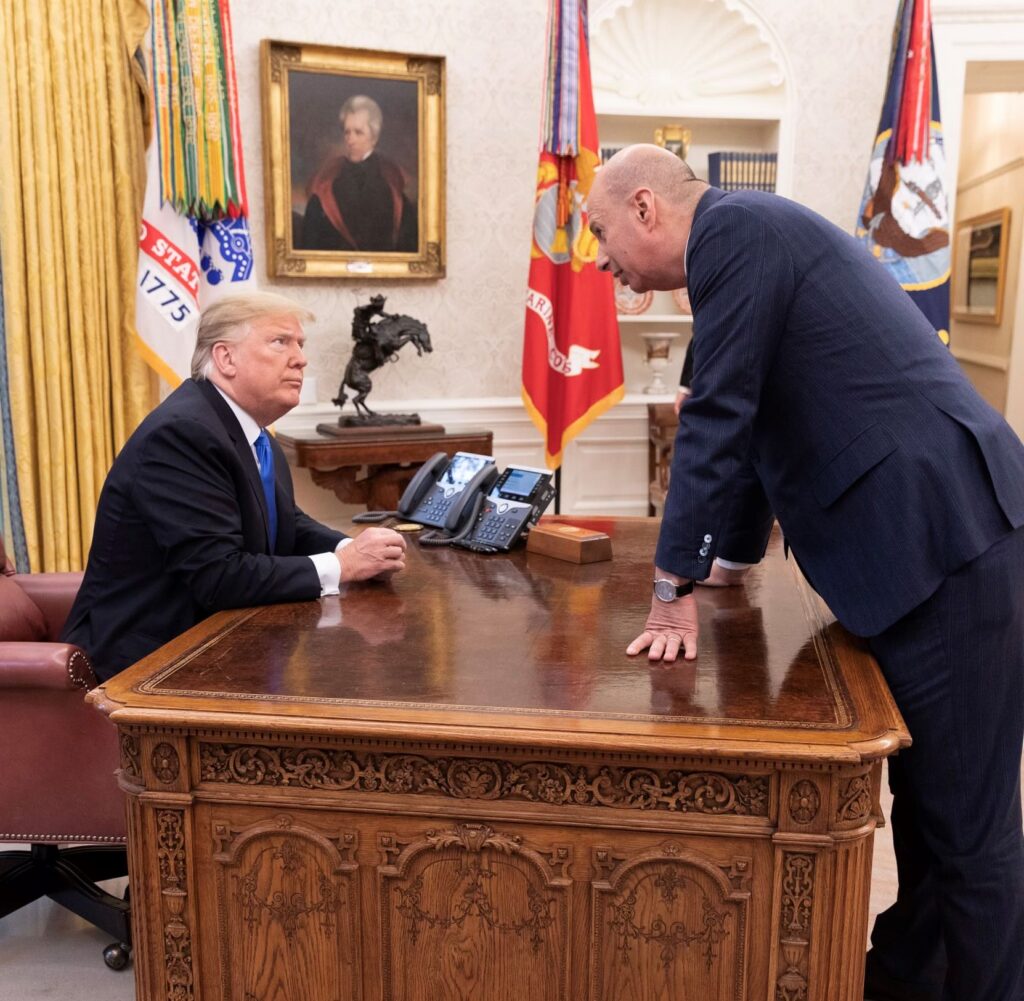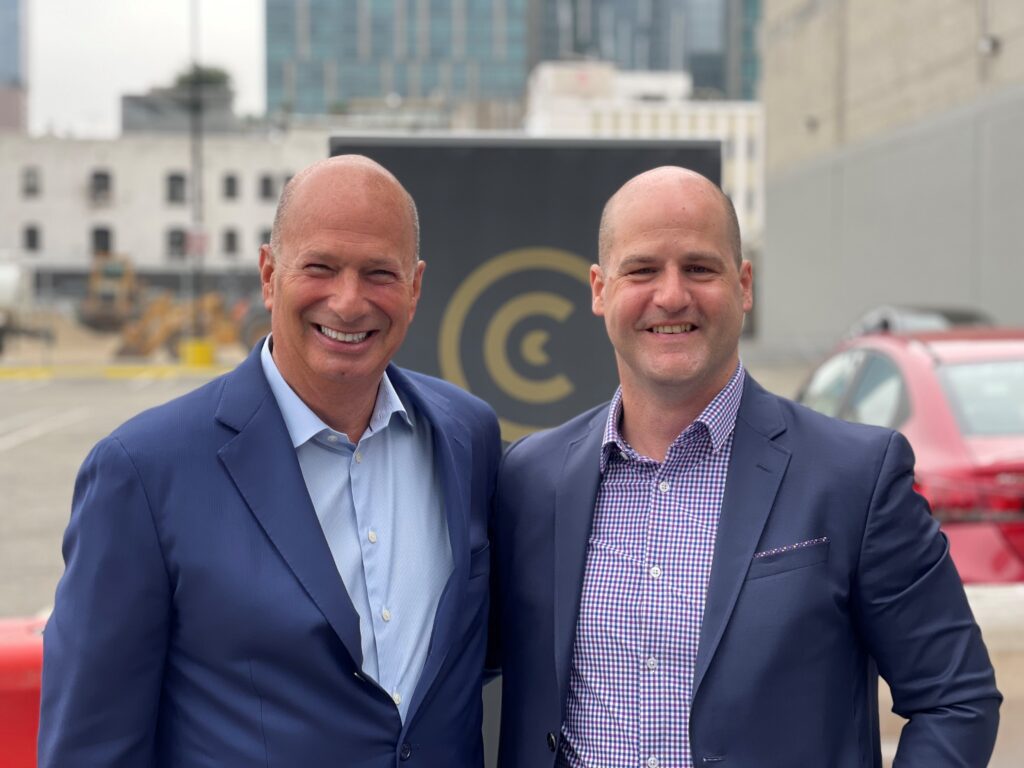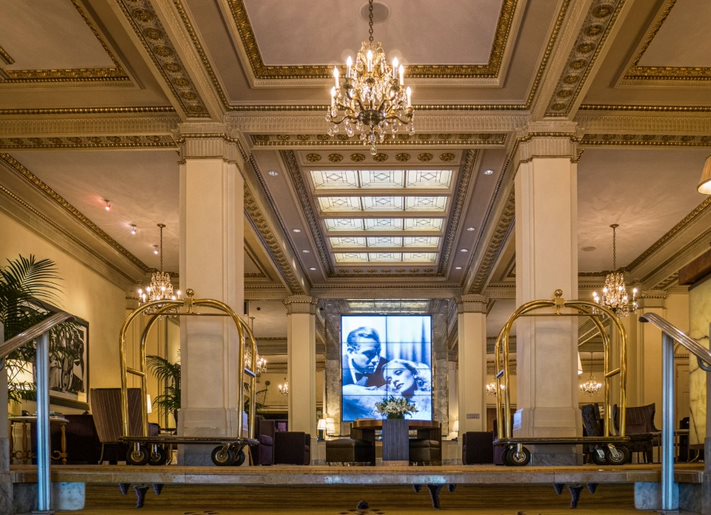Two minutes before phoning Gordon Sondland, I was apprehensive, struggling with how to address him. For two fraught years, he served as the U.S. Ambassador to the European Union, appointed to the position by former President Donald Trump. Would it be Ambassador? Gordon? I polled my parents and, as lefty D.C. folk, they provided no help, but did offer a polemic on the sins of the Republican party.
Judges are addressed as judge or your honor, former cabinet members are secretaries in public and doctors are doctor—with the assumption that practicing or retired they retain the title. The decision was mine and I played it safe.
I dialed the Seattle area code and an upbeat voice answered hello. “Ambassador Gordon Sondland,” I announced. The response was quick: “Call me Gordon.” Problem solved.
That was my introduction to Gordon, who the world may know better as the man, who in November 2019, testified as a witness at the impeachment inquiry against Donald Trump. He subsequently joined a long list, from government rank and file to Apprentice contestants, to get the heave-ho from Trump, when he was fired two days after the trial, on February 7, 2020.
Sondland isn’t too sore over the spectacular end to his ambassadorship. He’s since written a book about his experience entitled “The Envoy: Mastering the Art of Diplomacy with Trump and the World,” which he has been promoting almost nonstop on LinkedIn since it was published last year and joins a litany of books detailing working within the Trump administration.

BEFORE TRUMP
He doesn’t shy away from talking about his time with the former president and his ambassadorship to the E.U., but he’s as easy talking about his day job. Ambassador Gordon Sondland, the hotelier.
Long before his dealings with Ukrainian President Volodymyr Zelenskyy went public or raising his right hand to testify before Congress, Sondland was kicking the tires on commercial real estate projects and creating his own hotel company. He was born and grew up just outside Seattle and his start in real estate, as he describes it, was not unique. He began as a broker, marketing all sorts of real estate classes, from industrial to retail. Then a hotel came on his radar and he ended up purchasing it out of bankruptcy after the bankruptcy trustee engaged his brokerage to sell it. His firm said that as long as they got the commission, it was fine by them, a practice Sondland said likely wouldn’t be above board today. Nonetheless, with the help of friends, family and fundraising, he raised enough equity to acquire the property, which was The Roosevelt Hotel in Seattle.
As Sondland tells it, those were the days that if you bought a historic property, which this was, and held onto it for five years, you could essentially make all your money back in tax credits. “My investors were sort of betting a little bit on the jockey, but they were betting more on the tax-credit horse because they knew I had no experience in operating a hotel,” said Sondland, who ended up hiring a local management company to run it. Shortly after, Sondland left the brokerage practice and started putting together syndications.
Then he went mano a mano with Bill Kimpton.
Bill Kimpton is the originator of the Kimpton hotel brand, since acquired by IHG in 2014. At the time, the man from San Fran was—still is—considered the progenitor of the lifestyle or boutique concept. It turns out, he had a five-hotel portfolio tied up under a non-binding, letter of intent. The intrepid, wily Sondland went to the seller and ended up outbidding Kimpton. “Kimpton then called me; obviously wasn’t happy about it,” Sondland said. But he wasn’t resentful and shortly thereafter he and Sondland had a business breakfast, which turned into a half-a-day discussion, Sondland recalled, that ended back at Kimpton’s San Francisco office, where Sondland was led around and met the core Kimpton employees.
In the end, Sondland and Kimpton teamed up, went back to the seller together and wound up getting the portfolio for less than what Kimpton had it originally tied up for.
Whether fate or mere coincidence, Sondland crossing paths with Kimpton rubbed off on him: Provenance Hotels, his hotel company that owned and managed hotels, particularly in the Pacific Northwest, contained properties that were decidedly of independent spirit, taking historical and cultural cues from the locations they inhabited.

AFTER TRUMP
Past tense, because in December 2022, Provenance Hotels closed on a strategic venture with an entity combined of Gencom, a Miami-based owner and developer of hospitality and residential properties, and Corten, a private real estate investment fund manager headquartered in Wilmington, Del., whereby the partnership acquired a 50% ownership stake in eight hotels across the U.S., while Pyramid Global Hospitality, a Gencom affiliate, will manage the entirety of Provenance Hotels’ portfolio of 12 hotels.
The eight properties jointly owned include The Dossier, Sentinel, Hotel Lucia and Hotel Deluxe in Portland, Ore.; Old No. 77 Hotel & Chandlery in New Orleans; Hotel Max and Hotel Murano in Seattle; and Hotel Preston in Nashville.
In addition to the eight hotels, Pyramid will manage four hotels owned by third parties that were earlier operated by Provenance — Hotel Theodore in Seattle, Heathman Hotel and Woodlark Hotel in Portland and The Bradley in Fort Wayne, Ind. In total, Pyramid’s portfolio of managed properties will grow by 1,952 rooms and suites.
If not for COVID, however, the deal may have never been consummated. “We were on a trajectory prior to COVID to building up not only the Provenance brand, and eventually taking it into a franchise model, but creating opportunities for independent hoteliers, who wanted a blueprint for the curation of their assets around the arts,” Sondland said, effectively referring to a collection brand, of sorts.
COVID altered those best-laid plans. “I returned from my government service and that changed everything,” he said.
Provenance’s hotels, similar to many others, faced a misty future, hemorrhaging money in the early days as revenue waned. “We owned assets that needed quite a bit of financial support because we were not in markets that were quick to recover,” he said, noting Seattle and Portland, which at the time were facing volatile situations from protests. “Our bread and butter was business travel and our customers shunned both of those markets for a long enough period of time and we had huge mortgages to support,” Sondland said.
In the end, scale won out, but Sondland isn’t one to be marginalized. He still has a holding company that contains additional real estate, including retail, office, industrial and multifamily. “We own the real estate, we manage it, we buy and sell and that will continue on,” Sondland said, while he will also continue to work with Gencom on new opportunities.
For all the things he saw as a U.S. ambassador, he’s seen even more as a hotelier, through various cycles. “Things seem to come full circle, they just come back in a different iteration,” Sondland said. For example, the hotel industry for more than a decade now has moved further into automation as a means for streamlining the hotel experience. Now, he sees a backlash against it, in what he referred to as COVID isolation. “I think people want to be greeted at the door; they want a smile; they want to be helped to their room with their bags if they’re traveling heavily.”
Automation and technology aren’t going away, they are just complementing personalization. “There’s going to be a hybrid of technology and personal touch,” he said. Total automation, he said, might sound like nirvana for a CFO, “but I’m not sure that the average guest wants to interact that way.”
Sondland’s book recounts his time with Trump and working as ambassador to the EU. Among many anecdotes, he does use the hospitality industry as a comparison for working under Trump. “It was like staying at an all-inclusive resort,” he wrote in the book. “You’re thrilled when you first arrive, but things start to go downhill fast. Quality issues start to show. The people who work the place can be rude and not so bright. Attrition is a huge problem. And eventually, you begin to wonder why you agreed to the deal in the first place.”
Still, he wouldn’t have traded the experience. “I would do it again in a heartbeat,” he said, before pausing… “for the right president.”

